
Content
Daring for Big Impact
June Event: the future of Transformation
The Future Show with Gerd Leonhard
Global Entrepreneurship Summit GES 2014
Club of Amsterdam blog
News about the Future
Recommended Book: Big Bang Disruption
How to Survive and Thrive in the Age of Disruption
Futurist Portrait: Danielle Nierenberg
Agenda
Welcome to the ClubofAmsterdam Journal.
Join the Club of Amsterdam in June event about the future of Transformation, Thursday, June 26, 2014
“Transformation is everywhere. Due to changes in the economy, the climate, technology and lifestyle we are transforming our infrastructure, our houses, our companies our cities and ourselves all the time. This evening we will discuss the future of transformation. Big plans and top down is over, are we ready now for bottom up or are there other strategies to think of?”
Club of Amsterdam is a Knowledge Partner of the Global Entrepreneurship Summit GES 2014
Felix F Bopp, Founder & Chairman
Daring for Big Impact

by Maximilian Martin, Founder and Global Managing Director, Impact Economy SA
Impressions from the 4th Impact Economy Symposium & Retreat
The 4th Impact Economy Symposium & Retreat that was held from June 13-15, 2014 on the shores of Lake Constance in Switzerland. The event annually convenes key influencers, thought leaders, and practitioners from the worlds of investment, business, government, and philanthropy in order to surface the most effective solutions, innovations, and opportunities that have surfaced in the promotion of impact.

Global leaders of impact capitalism gathered last weekend to unpack the theme of Daring for Big Impact: Blending Inspiration, Innovation and Investment. Impact Economy-the global impact investing and strategy firm-tasked the group to work through five main topics that each have the potential to drive much wider, mutually enabling impact: using the power of storytelling and media to move global warming up on the agenda of the world; mainstreaming impact investing through market-building at the level of the G7 and concrete investments; using Corporate Impact Venturing to enable companies to innovate and upgrade corporate venture capital by investing for impact; redesigning global value chains to achieve a sustainable future, with a special focus on the future of the fashion industry; and exploring the country frontiers with exceptional potential, namely the EMICs (Ethiopia, Myanmar, Iran and Colombia), which Impact Economy Founder and Global Managing Director Dr. Maximilian Martin, who also moderated the event, has identified as a set of catalytic countries.
The three-day journey was rounded out by the participation of two spiritual leaders, Han Shan and Swami Nitya, who reminded delegates that people are the true center of positive change, and that improving the state of the world through private initiative, business and investments remains an unlikely proposition if we are not ready to also work on ourselves to unleash our full human potential and give our very best.
An exclusive viewing session was conducted on Impact Economy investee Years of Living Dangerously, a nine-episode television series on climate change that was produced by David Gelber, James Cameron, Arnold Schwarzenegger and stars Hollywood A-listers such as Jessica Alba, Harrison Ford, and Matt Damon. This documentary series brings to life the stakes in a country like Bangladesh, where a one meter sea level rise would flood 17 percent of the country, and what US president Barack Obama, who was interviewed for the series by New York Times columnist Tom Friedman intends to do about it, triggering an engaged discussion with executive and co-producers.
Throughout, a rich, fast-paced program showcased the possibilities in terms of impact, and challenged participants to aim higher with their own pursuits. Some sessions were eye-opening. Dr. John Cheh, Vice Chairman and CEO at Esquel Group in China, demonstrated how an integrated textile and garment supply chain can achieve remarkable competitiveness as well as social and environmental performance. This presentation provided an aspirational example for Impact Economy’s work and ambition-setting for the industry as covered in the report Sustainable Apparel Value Chains, which shows that boosting total resource productivity, working conditions, and future-proofing profits need not be at odds with each other.
In a world where impact investors sometimes focus on the single deal at the expense of a wider country perspective, the new set of countries presented by Impact Economy, namely the EMICs (Ethiopia, Myanmar, Iran, and Colombia) triggered great delegate interest: as high-stakes, high-opportunity countries, they allow impact investors to make a key difference in contributing to achieve inclusive growth. Speakers Ebrahim Afsah, Associate Professor of Public International Law at the Faculty of Law, University of Copenhagen; His Excellency Dr. Giulio Haas, Swiss Ambassador to the Islamic Republic of Iran; Khin Lay, Former Leader of Central Youth Wing of National League for Democracy in Myanmar; Frank W. Michel and Meseret Moges, Co-Founders, FriendsUnited Foundation, Ethiopia; and Philippe G. Nell, Minister and Head of the Americas Unit at the State Secretariat for Economic Affairs generously shared their deep insights into what smart investors should consider when aiming to invest for impact in the EMICs.
As a pioneer in impact investing, Impact Economy shared additional pointers on how impact can be made investible. This presentation was followed by a fruitful discussion between representatives from the UK Cabinet Office, UBS and Novartis concerning what business and government are looking for, and can contribute, to further market building. The way in which the changing tectonics of value creation at the base of the pyramid, the rise of virtuous consumers, green growth and the circular economy are creating multitrillion-dollar markets and fueling a paradigm shift in the corporate world was another central topic, examined through the lens of Corporate Impact Venturing; a strategy that marries the worlds of corporate venture capital and impact.
After three insight-packed days at a 450-year old Swiss castle, complemented by power networking and time for reflection, the delegates adjourned on Sunday-enthusiastic to bring fresh ideas and connections to bear in their pursuits starting on Monday morning, thus blending inspiration, innovation and investment.
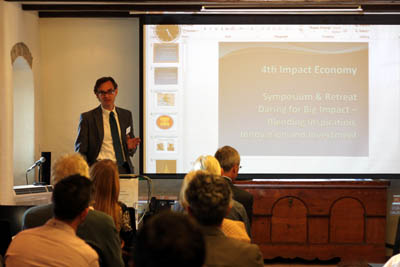
Impact Economy is an impact investment and strategy firm based in Lausanne, Switzerland, with overseas operations in North and South America out of New York and Buenos Aires. Working with professional investors and companies, the firm’s mission is Making Impact Investible.
June Event: the future of Transformation
the future of Transformation
Thursday, June 26, 2014
Location: Cabral Gebouw, Cabralstraat 1, 1057 CD Amsterdam (Near Mercatorplein)
The event is supported by the Coop MidWest and the Andragologie Alumni Amsterdam.
Transformation is everywhere. Due to changes in the economy, the climate, technology and lifestyle we are transforming our infrastructure, our houses, our companies our cities and ourselves all the time. This evening we will discuss the future of transformation. Big plans and top down is over, are we ready now for bottom up or are there other strategies to think of?
With
Evert Verhagen, founder and owner, Creative Cities
Transformation in cities
Karin Jironet, co-founder of In Claritas
Things change all the time, but sometimes, things will never be the same again.
Louise van Schaik, Senior Research Fellow & Coordinator Global Issues, Governance and Diplomacy, The Clingendael Institute
The politics of climate change
Huseyin R Demirhisar, CIO, Managing Partner, Angel Wings Ventures
The Impact Investment Now!
and our moderator Annegien Blokpoel, CEO, PerspeXo
The Future Show with Gerd Leonhard

Overview and introduction
Technology and the world that we are living in is changing exponentially and most of the time its hard to keep up especially for those who arent experts, geeks or early adopters. Its for this reason that Futurist Gerd Leonhard created this new web-TV show which aims to present and explain the most pressing issues and exciting future trends to the general public whether theyre savvy consumers, worried parents or curious professionals and business influencers. Every TFS episode is hosted by Gerd and will deliver easily digestible insights in a critical, yet engaging and exciting way.
TFSs goal is to show how technologys exponential advancements will radically alter and re-design the way in which we experience the world and interact with each other in the immediate and longer term future. TFS episodes are between 4-7 minutes in length and cover topics that are timely and relevant, impactful and of strong interest to the general public as well as to the global business community. Themes include: Privacy Failure, Human-Machine Futures, The Future of Jobs, Digital Obesity, Sustainable Capitalism, Big Data and many more.
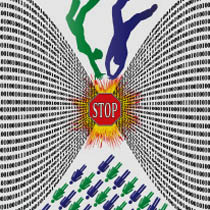
Episode 1: Privacy Failure
Is privacy really dead? Would a world without anonymity really be desirable? Should we simply accept that our communications, opinions, images, movements and actions are 99% public by default? Will wearable computing devices such as Google Glass, medical self-monitoring devices and smart watches and the rise of the Internet of Things (IoT) make it even harder to adhere to some kind of privacy standard? Will we really live in world where everything that happens must be known (read Dave Eggers book The Circle)? TFS host and creator Gerd Leonhard believes that in a world where almost everything is watched, recorded and analysed, and where information spreads like wildfire, we urgently need to strike a personal balance between openness and transparency and a collective standard of privacy, and frequently review our data-sharing paradigms to avoid entering into truly Faustian bargains. Allowing for mistakes and imperfections is what makes us human, but how would still uphold this concept if we are being monitored and quantified all the time?
Episode 2: Knowledge and Learning
The perceived value of data, basic information and fact-based human knowledge is becoming increasingly commoditised by the efficiency and sheer horse-power of digital technologies. Any Internet user can now look up, find out and tap into almost any information, anywhere, anytime and very soon, artificial intelligence and so-called cognitive computing will become as normal as sending an SMS. The traditional education paradigm of just-in-case learning is being challenged by the just-in-time learning approach that the Internet seems to afford. As a result, human ingenuity and intuition (knowing without knowing), creativity, social or emotional intelligence and a new kind of wisdom will matter increasingly. Are we moving on from the industrial/information age and its left-brain emphasis to a kind of right-brain renaissance, and will we see a new triumph of creativity, storytelling and imagination? Or will machines and software eat our world and turn us into useless wetware? What skills do we need to teach ourselves or our children so that they can he happy and prosper 5-10 years from now? How will they be successful in those jobs that havent even been invented yet? What will happen to educational institutions, schools, colleges and universities, and will degrees and certificates still be as valuable as they are today? If learning is a lifelong flow and in-demand instead of just-in-case, how will our educational systems evolve?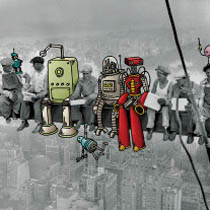
Episode 3: Work and Jobs
In the future, most repetitive or machine-like tasks and jobs will be largely offloaded to ultra-smart software and intelligent machines, wether in the manufacturing, financial services, government, transportation or technology sectors. By 2025, up to 45% of jobs might be automated-away in many sectors making a redefinition of work and jobs an urgent priority for governments, industry and educators alike. Gerd believes that the trend away from the jobs-that-robots-can-and-will-do will also free us up to re-focus on those tasks that only us humans can do. Skills or character traits such as creativity, pattern recognition, imagination and storytelling will once again become increasingly important as machines are not yet suited to tackle them, at least in the foreseeable future. As an example, whereas travel agents used to spent the majority of their time searching databases for hotels and flights in the past, they are now focusing on putting highly-tailored travel packages together and offering personalised advice the basic database of flights and hotels is available to everyone, now. This trend towards the right brain will of course pose significant challenges to those who were used to doing pure human computing tasks such as statistics and data analysis, or that were employed in mostly repetitive manufacturing environments. In the future, we are very likely to see what Gerd calls workupation and quite possibly a lot more debate on the concept of the guaranteed minimum income in response to rampant technological unemployment
Global Entrepreneurship Summit
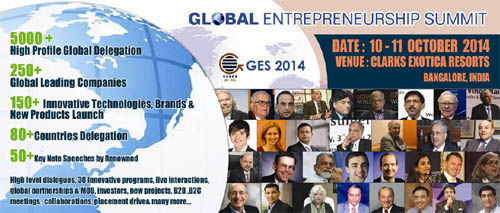
Club of Amsterdam is a Knowledge Partner of the
Global Entrepreneurship Summit GES 2014
October 10-11, 2014, Bangalore, India
http://www.ges2014.com
Global Entrepreneurship Summit is a global platform to share experience, learning & innovations in entrepreneurship & exploring the global opportunities.
GES is the World’s largest entrepreneurship summit specially focused on global business scenario, emerging startups, women entrepreneurship, youth entrepreneurship, global brand creation, innovations in entrepreneurship & many more interactive sessions by renowned top leading industrialists, global business leaders, policy makers, entrepreneurs, investors, innovators, chairman, CEO & MD of reputed organizations across the globe will gather and share their experiences.
Club of Amsterdam blog

Club of Amsterdam blog
http://clubofamsterdam.blogspot.com
Socratic Design
by Humberto Schwab, Philosopher, Owner, Humberto Schwab Filosofia SL, Director, Club of Amsterdam
The Ukrainian Dilemma and the Bigger Picture
by Hardy F. Schloer, Owner, Schloer Consulting Group – SCG, Advisory Board of the Club of Amsterdam
The impact of culture on education
by Huib Wursten, Senior Partner, itim International and
Carel Jacobs is senior consultant/trainer for itim in The Netherlands, he is also Certification Agent for the Educational Sector of the Hofstede Centre.
What more demand for meat means for the future
by Christophe Pelletier, The Happy Future Group Consulting Ltd.
Inner peace and generosity
by Elisabet Sahtouris, Holder of the Elisabet Sahtouris Chair in Living Economies, World Business Academy
News about the Future.

Future of Government Smart Toolbox
The Future of Government Smart Toolbox demonstrates how technology can enhance government performance by strengthening efforts to reduce corruption and bureaucracy and enhance political representation, service delivery, trust, leadership, security and innovation. The report highlights successful state practices from around the globe in the digital era. Report by the World Economic Forum.

Manipulating and Detecting Ultrahigh Frequency Sound Waves
Berkeley Lab researchers have demonstrated a technique for detecting and controlling ultrahigh frequency sound waves at the nanometer scale. This represents an advance towards next generation ultrasonic imaging with potentially 1,000 times higher resolution than todays medical ultrasounds. –
Recommended Book

Big Bang Disruption: Strategy in the Age of Devastating Innovation
by Larry Downes and Paul Nunes
Consumer electronics and computer makers have long struggled in a world of exponential technology improvements and short product life spans. But until recently, hotels, taxi services, doctors, and energy companies had little to fear from the information revolution.
Those days are gone forever. Software-based products are replacing physical goods. And every service provider must compete with cloud-based tools that offer customers a better way to interact.
Today, start-ups with minimal experience and no capital can unravel your strategy before you even begin to grasp whats happening. Never mind the innovators dilemmathis is the innovators disaster. And its happening in nearly every industry.
Worse, Big Bang Disruptors may not even see you as competition. They dont share your approach to customer service, and theyre not sizing up your product line to offer better prices. You may simply be collateral damage in their efforts to win completely different markets.
The good news is that any business can master the strategy of the start-ups. Larry Downes and Paul Nunes analyze the origins, economics, and anatomy of Big Bang Disruption. They identify four key stages of the new innovation life cycle, helping you spot potential disruptors in time. And they offer twelve rules for defending your markets, launching disruptors of your own, and getting out while theres still time.
Based on extensive research by the Accenture Institute for High Performance and in-depth interviews with entrepreneurs, investors, and executives from more than thirty industries, Big Bang Disruption will arm you with strategies and insights to thrive in this brave new world.
How to Survive and Thrive in the Age of Disruption
Top 12 Insights from Communicasia 2014

By Madanmohan Rao
The annual Communicasia conference and expo in Singapore always turns out to be a good time to take stock of local and global telecom changes, network with industry, discover new startups, check out the latest gadgets and gizmos, and party late into the night! Parallel tracks cover mobile, broadcast media and enterprise IT. One key theme which seems to run across many tracks this year is disruption: identifying, understanding, surviving and leading exponential upheavals. Here are my Top 12 takeaways from the speakers discussions and insights on dealing with digital disruption.
1. Understand the scale and speed of disruption
In digital media space, the market value of the Top 15 Internet and OTT (over the top) players is larger than that of the Top 100 publicly-traded telcos. And most of these Internet and OTT companies did not even exist 10 years ago, such as Facebook, Tencent, Baidu, Naspers, Salesforce.com, Twitter and LinkedIn. In just a decade, these new entrants have been able to create as much market value as incumbents did over a century. It is not just this kind of scale that was unthinkable, but even the qualitative aspects of digital life that seemed like science fiction just a couple of decades ago such as Internet of Things and smart cities.
2. Denial is not the answer
Trying to block new disruptors is not the answer: learn how to work with them. Many telcos tried to block services like Skype and WhatsApp, but that is not the solution. Just because voice and SMS revenues are declining does not mean denial of OTT or submission to them is the only option. More progressive solutions would be AT&Ts deal with Pandora for mobile music streaming, Verizon with Skype, 3 Hong Kong with WhatsApp and KDDI with Line in Japan.
3. Startup alliances are a road to innovation and scale
Startups need partners like telcos for scale, and telcos need startups and grassroots developers for their innovation energy. For example, startup Evernote tied up with NTT DoCoMo for funding and market scale in Japan; it tied up with StarHub to expand in the Singapore market. It has a fulltime team of 15 people to manage alliances with telcos around the world. SingTel bought three startups in an acqui-hire arrangement, including HungryGoWhere (restaurant booking app). In other domains, governments are sharing their information assets with industry via Open Data models to help spur local Big Data ecosystems.
4. Use crowdfunding to validate new ideas
Place a mix of a few large bets and many small bets to see which would succeed in or disrupt the market. Test new ideas through crowdfunding to validate them as well as raise funds. Singapore telco Starhub runs a crowdfunding initiative called Crowdtivate for emerging startups, with mentorship and regional outreach programs. Angel investors themselves are turning to crowdfunding sites to identify new bets and learn from the market.
5. Tap social media across the entire purchase cycle
Social media along with mobile are giving consumers even more power than before, disrupting the older power equation of brands. It is not just in pre-purchase research or post sales stages that consumers are sharing their brand experiences but at every single touch point including receiving the first bill, filing complaints and resolving technical issues. Brands should understand the consumer conversation at each of these stages.
6. Listen to customers and co-innovate with them
OTT players and startups are mastering the art of innovating along with customer needs, in lean and agile models. Feedback is continually solicited from customers at every stage, giving them a powerful disruptive edge. In contrast, telcos make it very hard for consumers to talk to their representatives and show little interest in learning from them even though, ironically, consumers want to help telcos provide better services. A few operators do try to learn from consumer complaints, such as O2, which is even using British humour in some of its customer response tweets. China Telecom is tapping its consumers for ideas and getting hundreds of them.
7. Dont underestimate ecosystem challenges
Ten years ago, some industry players claimed that NFC (near field communication) would disrupt the payment world. They are still saying that. The ecosystem challenges in the digital acceptance network have been complex readers, handsets, consumer friendly security procedures, and so on. Digital wallets are still in transition phase, but will eventually take off, eg. MasterPass, Google Wallet. There will finally be ease of offline/online payment and delivery in omnichannel e-commerce across any device, including ones such as Google Glass.
8. Rethink old media
The broadcast era of spectrum allocation is not set in stone. There are new frequencies available for satellite Internet, such as TV Whitespace. They can open up new frontiers in bridging the digital divide in rural areas, and change the previous equations of access and distribution. Disruption is coming here too who would ever have thought that Google and Facebook would one day get into the Internet access business via atmospheric balloons and drones?
9. Develop an Asia strategy
Asia is on the move. The rise of Japan and South Korea disrupted the world order in the second half of the previous century, followed by the rise of China and India. They are not just large markets but launchpads of new global tech and media players, and are re-drawing hardware, software and services maps. Now other Asian countries are on the move: Indonesia and Vietnam, followed by Myanmar. IBMs 2014 Telecom Consumer Survey across 35 countries showed that Asian consumers expect to spend more on mobile services in the next few years, whereas much of Europe is in an economic downturn and its consumers want to cut down mobile expenses. What is your Asia strategy?
10. Progressive governments can make a difference
Smart city initiatives with Internet of Things and connected devices are being launched in cities around the world, from Amsterdam to Barcelona and the city-state of Singapore is also aiming to become a smart nation by 2025. Its Smart Nation Platform (SNP) will allow government agencies and industry to connect, collaborate and comprehend the new kinds of services that can be incubated and scaled up for mass markets in healthcare, transportation, recreation and the like. Emerging markets which dont have a Silicon Valley-like ecosystem will need government support for incubators, eg. Indonesia.
11. Prediction is hard but you must try
Tech dominance in one era is no guarantee of understanding and succeeding in the next. Almost 20 years ago, Bill Gates wrote a book called The Road Ahead, talking about the emerging opportunities for Microsoft which dominated the PC era. Today it seems to have missed leadership positions in the mobile and cloud era. Google led the world in Web-based search, but new players are outflanking it in performance-based search, including psychographic models.
12. Dont forget analogue
Much as we are infatuated and habituated with digital media, there is still a large segment of society which is in a predominantly analogue world. Creative approaches like notice boards carrying information from cybercafés will continue to bring alerts and resources to rural communities but ultimately they too will be disrupted by digital.
In sum, dealing with disruption requires a range of strategies to engage emerging disruptors and existing consumers. Culture change is tough, and a company or country may miss one wave of paradigm shift but can regroup to catch the next wave if it is nimble and savvy enough (see my review of the excellent book Big Bang Disruption by Larry Downes and Paul Nunes and my interview with the authors).
At a larger societal level, fundamental notions of data privacy, ownership and usage are being disrupted, and will require new kinds of interpretation and enforcement. Welcome to the Brave New Digital World!
Madanmohan Rao is research director at YourStory Media and editor of five book series (http://amzn.to/NpHAoE). His interests include creativity, innovation, knowledge management, and digital media. Madan is also a DJ and writer on world music and jazz. He is in the Board of Advisors of the Club of Amsterdam. He can be followed on Twitter at @MadanRao. The original article can be found here.
Futurist Portrait: Danielle Nierenberg
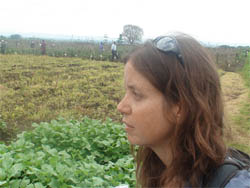
Danielle Nierenberg is President of Food Tank: The Food Think Tank and an expert on sustainable agriculture and food issues. She recently spent two years traveling to more than 35 countries across sub-Saharan Africa, Asia, and Latin America meeting with farmers and farmers groups, scientists and researchers, policymakers and government leaders, students and academics, and journalists collecting their thoughts on whats working to help alleviate hunger and poverty, while also protecting the environment. She has spoken at major conferences and events all over the world and her knowledge of global agriculture issues has been cited widely in more than 3,000 major publications including The New York Times, the Wall Street Journal, USA Today, the International Herald Tribune, The Washington Post, BBC, the Guardian (UK), and other major publications. Danielle served as the Director of the Food and Agriculture program at the Worldwatch Institute. She also worked for two years as a Peace Corps volunteer in the Dominican Republic.
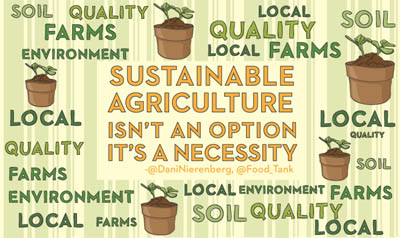
Danielle Nierenberg: “Our food system is broken. Some people dont have enough food, while others are eating too much. Theres only one way to fix this problemand it starts with you and me.
Food Tank is for the 7 billion people who have to eat every day. We will offer solutions and environmentally sustainable ways of alleviating hunger, obesity, and poverty by creating a network of connections and information for all of us to consume and share. Food Tank is for farmers and producers, policy makers and government leaders, researchers and scientists, academics and journalists, and the funding and donor communities to collaborate on providing sustainable solutions for our most pressing environmental and social problems.
As much as we need new thinking on global food system issues, we also need new doing. Around the world, people and organizations have developed innovative, on-the-ground solutions to the most pressing issues in food and agriculture. Through years of field visits (and years of trying to eat better in her own community) our President Danielle Nierenberg has helped to highlight and promote these best practices. Today, we hope to bridge the domestic and global food issues by highlighting how hunger, obesity, climate change, unemployment, and other problems can be solved by more research and investment in sustainable agriculture.
Food Tank will highlight hope and success in agriculture. We will feature innovative ideas that are already working on the ground, in cities, in kitchens, in fields and in laboratories. These innovations need more attention, more research, and ultimately more funding to be replicated and scaled-up. And that is where we need you. We all need to work together to find solutions that nourish ourselves and protect the planet.”
“We need a food system where science is our servant–NOT our master!”
Agenda


Season Events 2013 / 2014

June 26, 2014
the future of Transformation
Location: Cabral Gebouw, Cabralstraat 1, 1057 CD Amsterdam (Near Mercatorplein)
The event is supported by the Coop MidWest and the Andragologie Alumni Amsterdam.
Knowledge Partner
Club of Amsterdam is a Knowledge Partner of the
Global Entrepreneurship Summit GES 2014
October 10-11, 2014, Bangalore, India
Special Supporters












Customer Reviews
Thanks for submitting your comment!